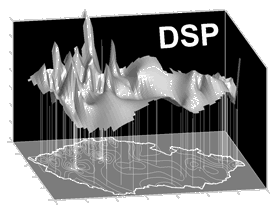| Digital signal and image processing |
|
|
(DSP) represents a
very general discipline that joins completely different topics of
scientific research using very similar mathematical tools and algorithms.
In this way it corresponds to the vision of a very famous philosopher G. W.
Leibnitz (1646-1716) who tried to find the joint basis of different
scientific disciplines to minimize communication problems of specialists
of different areas of science. The feature of DSP as a link between
different scientific problems is emphasized also now in papers of
Prof. B. Widraw devoted to artificial neural networks.
In the modern world digital signal processing forms a basis for different
research areas including information engineering, measuring engineering,
control engineering, communication technologies, technical cybernetics and
biomedical engineering. The major research topics of the DSP group cover both
theoretical methods including signal decomposition and reconstruction based
on the Wavelet transform and applications in different areas.
|
10: Signal Modelling
11: Detection, Estimation and Identification
12: Signal Segmentation and Classification
13: Modelling, Approximation and Optimisation
14: Non-linear Signal Modelling
|
20: Signal and Image Analysis
21: Time-Frequency and Time-Scale Signal Analysis
22: Discrete Wavelet Transform
23: Statistical Methods
24: Adaptive Methods in Signal Processing
|
30: Signal Prediction
31: Statistical Methods for Signal Prediction
32: Neural Networks and Learning Theory
33: Evolutionary Computation
34: Digital Filters
|
40: Applications
41: Biomedical Signal Processing
42: Image Processing
43: Enviromental Signal and Image Processing
44: Engineering Signal Processing
|
| |
|
| |
|
| Linear and Non-Linear Methods of Time Series Prediction |
|
Project goal is in the analysis of autoregressive methods and
neural networks for signal prediction, reliability limits evaluation
and model simplification by principal components analysis and
orthogonal decomposition. Mathematical methods are applied to gas
consumption data processing.
|
| |
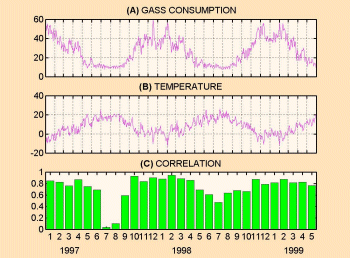
|
| |
|
| Neural Networks in Digital Signal Processing |
|
Project includes methods of change-point detection, signal features
extraction and signal classification with application to biomedical
(EEG) signals. The mathematical background includes application
of the Short time Fourier transform and Wavelet transform.
|
| |
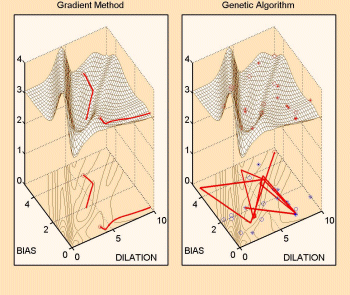
|
| |
|
| Biomedical Image Processing and Classification |
|
Methods of image analysis and their linear and non-linear processing
are used to perform signal de-noising, enhancement, detection of its
components and their identification. The goal is in biomedical (NMR)
image processing using Wavelet image decomposition and reconstruction,
spline interpolation and gradient methods.
|
| |
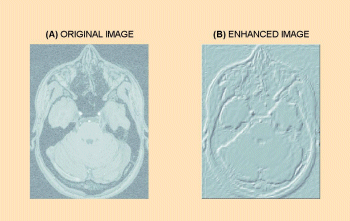
|
| |
|
| Environmental Image Analysis and Processing |
|
Project goal is in image analysis, correlation and de-noising
by two-dimensional Wavelet transform. Application is in the
detection of dust particles by satellite observations and
verification of suggested methods and algorithms by ground
measuring stations.
|
| |
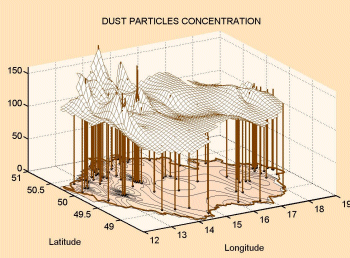
|
| |
|
| Keywords |
|
Digital Signal Processing - Image Processing - Time Series
Analysis – Discrete Fourier Transform - Spectral Analysis - Wavelet
Transform –Signal Decomposition and Reconstruction - Signal
De-Noising - Signal Segmentation - Change-Point Detection - Feature
Extraction - Signal Classification – Principal Component
Analysis – Orthogonal Decomposition
Artificial Neural Networks - Wavelet Networks - Optimisation
- Simulated Annealing - Genetic Algorithms – Linear and
Non-Linear Modelling – Numerical Methods - Signal Prediction –
Reliability Limits Estimation - Adaptive Systems - Artificial
Intelligence
Information Engineering – Data Acquisition – Sensors –
Computer Networks - Data Processing – Database Systems
Biomedical Signal Processing – Biomedical Image Analysis and
Enhancement - Environmental Protection - Satellite Data
Processing – Energy Consumption Prediction
|
| |
|
| |
